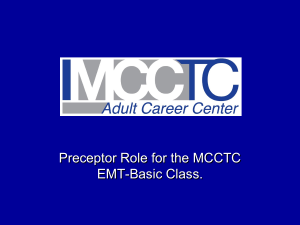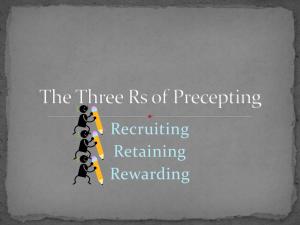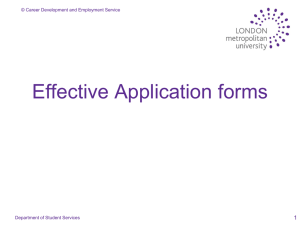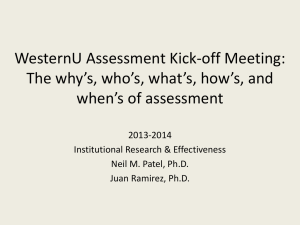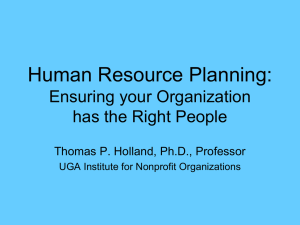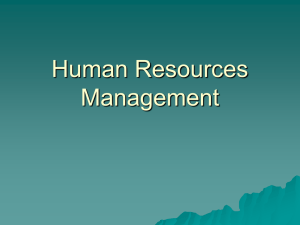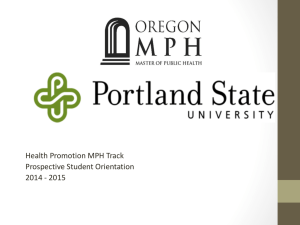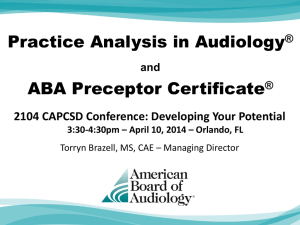Preceptor Orientation - Portland State University
advertisement
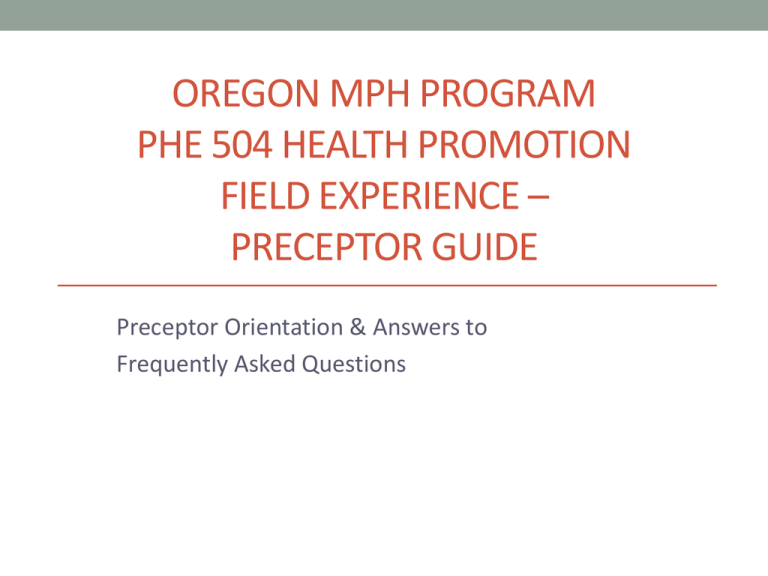
OREGON MPH PROGRAM PHE 504 HEALTH PROMOTION FIELD EXPERIENCE – PRECEPTOR GUIDE Preceptor Orientation & Answers to Frequently Asked Questions What is the Role of the Preceptor in the Field Experience? • Helps shape and facilitate the student’s project and Learning Contract • Supervises and guides the student through the field experience • Evaluates student performance by completing the Student Evaluation Form, and returns it to the Field ExperienceCoordinator • Communicates with Field Experience (FE) Coordinator regarding student’s performance (including issues or concerns). What are the Minimum Qualifications for Preceptors? • Public health credentials, by virtue of training and/or experience, for purposes of mentoring and evaluating the student in the application of the public health skills and knowledge developed during the MPH degree program • Potential Preceptors will be evaluated on a case by case basis • Preceptors may not be OMPH faculty or advisors, including at partner campuses What is the Field Experience? • A culminating experience for students in the OMPH Health Promotion Track • 6 credits total (200 hours), over 1 or 2 terms. We strongly recommend a 2 term field experience. • An opportunity to demonstrate mastery of Health Promotion Track and MPH Program Learning Competencies What is the Purpose of the Field Experience? • To demonstrate and apply knowledge and skills gained in a real world setting • To integrate theory and practice in a supervised, applied setting • Socialization into field of public health • To reflect on learning competencies in the context of the field experience Can Students Get Paid? • Payment is not expected, nor required • May be negotiated between student and Preceptor • Not a condition of establishing the PHE 504 Field Experience • University is not involved in these arrangements What Does the Field Experience Involve for the Student? • Participation in a project addressing a public health issue, with guidance of the Preceptor • Applying Health Promotion MPH classroom experience, knowledge, and skills • Daily journaling of work experience and reflections about the field experience • Bi-weekly communication with Field Experience Coordinator to provide status updates and upcoming plans What Does Field Experience Involve for the Student? (cont.) • Completing Summary Report, Evaluation, and providing examples of products developed (cleaned of any private or sensitive information) • Demonstrably meeting measurable Field Experience, track, and learning activities How Does the Student Identify a Relevant Field Experience Project? • Public health project of interest to the student --AND-• Project of interest and relevance to the field site • Work that integrates skills developed across the Health Promotion MPH curriculum • Work that provides an opportunity to demonstrate learning competencies • Can be manageably completed within 200-hour timeframe • Work that does not involve client transport in cars and clinical activity Position Descriptions • The Field Experience Application and Learning Agreement packet must include a formal position description • The student will work with Preceptor to develop a formal position description if one does not exist • Meet with the Field Experience Coordinator to review draft Position Description prior to week 5 submission • Should include: • General description of project you will be joining • Placement responsibilities • Required Skills • Terms of placement (location, start/end dates, etc. Student cannot work from home) • Description of placement site What is the Required Coursework? MPH in Health Promotion is a 59-credit degree •For a list of required courses, please see: http://www.oregonmph.org/content/healthpromotion-curriculum-and-competencies •Students can provide transcripts to Preceptors, upon request What are the Student’s Prerequisites for the Field Experience? • Completion of all core and track required courses in the Health Promotion MPH Program • Meeting with Faculty Advisor to discuss interests and possible sites • Meeting with FE Coordinator at least two weeks prior to submit for review • Position Description • Draft Matrix • Completion of Application and Learning Contract form and Field Experience Agreement (as required); provide copies of all materials to faculty advisor and Preceptor • Development of measurable learning competencies addressing, at minimum, Health Promotion MPH Competencies 1, 3, 4, 8, 9, and 10 (presented, below) What are the Health Promotion Track Competencies? 1. Apply theory in the development, implementation, and 2. 3. 4. 5. 6. evaluation of health promotion interventions, programs, and policies Develop interventions and programs to effect change at multiple levels, including individual, community, organization, and policy Design and implement strategies to promote health Solicit and integrate input from community and organization stakeholders Design and deliver health communication messages Evaluate and interpret results from program evaluations and other research What are the Health Promotion Track Competencies? (continued) 7. Define research problems, frame research questions, design research procedures, and outline methods of analysis 8. Apply ethical principles that govern the practice of public health 9. Enact cultural competency in diverse social and cultural communities 10. Develop a substantive Area of Emphasis (Students are required to address competencies in bold during their Field Experience) Why is The Learning Contract Important? • Specifies student’s learning competencies for the placement, and relates these to the Health Promotion track competencies • Identifies activities and roles student will fulfill • Lists the products student will develop during placement • Provides information about the site • Projects date of completion • Student must submit Learning Contract by 5pm on Monday of the 5th week of the term. • The Learning Contract is a CONTRACT. Failure to satisfactorily complete what is specified in the contract will result in the student not passing the placement What Goes into the Student’s Learning Contract? • Completed and signed two-page application form • Unofficial PSU transcript of classes to date • Current resume • Career goals • Specific, measurable learning competencies and activities for • • • • Field Experience – “Competency Matrix” Description of the work student will do at field site List of relevant courses completed, relevant theoretical principles, application Description of final products to submit Projected date of completion Sample Competency Matrix Track Competency 3. Design and implement strategies to promote health. FE Learning Competency Design a mixed-methods outcome evaluation plan to assess effectiveness of the Healthy Kids Learn Better Program training manual. Learning Activities 1)Discuss evaluation goals with program coordinator. 2) Revise existing survey of training manual effectiveness to include new components of program. 3) Develop a focus group script to evaluate effectiveness of training manual. 4) Identify sampling scheme What is the Field Experience Agreement? (Usually not required by agency) • A signed interagency agreement between PSU and field placement site • Delineates roles, responsibilities, and institutional terms of placement • Not in handbook; will be provided by FE Coordinators • Tailored to each placement • If required for your organization, must be complete and on file prior to start date • Contact FE Coordinators to see if your placement requires this agreement. Other Processes? • Human Subjects/IRB approval (if research placement). Must be completed prior to start of FE. • If the student is completing a project for internal use only within your organization (such as an evaluation), please submit an email to the FE Coordinator stating this. • NOTE: IRB approval is required for human subject research where information will be shared outside of the organization. IRB approval is not required for evaluation projects that are used internally within an organization. • International travel approval, if applicable How Does the Student Complete the Field Experience? • Meet all of the measurable FE Learning Competencies that support OMPH Track Competencies • Student responsible for submitting a final packet, in hardcopy by 5pm on Monday of the 9th week of the term in which the placement will be complete. Packet to include: • Updated FE Student Checklist Form (updated and signed by student) • Most recent approved Matrix • Summary Report • Evaluation Report (by student – see form on pg 19 of handbook) • Final Products (cleaned of any private or sensitive information) • Updated signed PHE 504 Checklist • Student Evaluation Form completed by Preceptor and return it to FE Coordinators by email. • Form and due date (end of week 9) to be provided to Preceptor by student. What is the Purpose of a Field Experience Summary Report? • To clearly demonstrate how the student’s specific FE Learning Activities and Competencies are reflections of the required OMPH Track Competencies. • This summary report should contain the following information: • Section I: Introduction • Overview of organization and of student’s position • Section II: Evaluation of Track & FE Learning Competencies • Each FE Learning Competency and Learning Activity restated • Description of how student met and demonstrated mastery of each • Reflection with descriptions of experience, challenges, additional work you would pursue, etc. • Section III: Reflections and Recommendations • Discussion of professional competency in relation to experience and matrix, career goals, and area of emphasis. Grading • Preceptor provides feedback to the FE Coordinator though direct communication during and after placement, as well as via the Student Evaluation form. • Faculty will grade all materials and provide final course grade and comments, integrating feedback from Preceptor • Preceptors are not required to grade summary reports and products • As of Fall 2014, students will receive a letter grade for this course How is the PHE 504 grade determined? The Field Experience Final Package is reviewed by the academic advisor and the FE Coordinators. • Pass: • Demonstrable accomplishment of ALL learning competencies • Preceptor’s Student Evaluation form submitted with favorable reviews • Required paperwork (including summary report, final products, FE checklist, evaluation form, updated matrix) complete and submitted • Not Passed: • Learning competencies not demonstrated • Required paperwork not complete and/or submitted • Poor Preceptor Student Evaluation What is the purpose of the Preceptor’s Student Evaluation form? • Allows the Preceptor to comment on the student’s performance. • Preceptor’s input will contribute to final grade. • Provides additional information to advisor and FE Coordinator regarding student performance • Provides useful process information for future students seeking FE placements • Please meet with the student prior to their completion of their placement and provide feedback on their performance (we keep your evaluation form confidential). What is the purpose of the Student’s Evaluation Report? • To reflect on the overall field experience • To identify the challenges and successes of the FE • To provide ideas regarding how the FE can be improved • To assist with future placement of students • To document applicability of the MPH competencies to the FE What are the deadlines for students? • Students must submit their completed Field Experience application by the 5th week of the term prior to the planned field term, in order to allow for all approval processes • Final products must be received by faculty on the Monday of Week 9 of the term • Students are to provide Preceptors the Student Evaluation form with due date, to be returned by the end of Week 9 of the term • Incompletes will be assigned, particularly if FE is spread across two terms (strongly encouraged) How do we resolve problems during PHE 504? Preceptors: • Work with the student to address any issues • Contact the FE Coordinator to discuss the situation • Rely upon the Learning Contract to frame the work Students: • Are encouraged to resolve problems directly with the Preceptor • If no resolution, students are to meet with the FE Coordinator • Rely upon the Learning Contract to ensure learning objectives are being pursued Who are the PHE 504 faculty? • Liana Winett, DrPH, MCHES Field Experience Coordinator 503-725-8262 lwinett@pdx.edu (for fastest response) • Chris de Venecia, M.A. Field Experience Assistant Coordinator cdev2@pdx.edu • Student’s Faculty Advisor (contact information will be provided by student in the Learning Contract) • For more information, please refer to the Graduate Field Experience Packet at: http://www.pdx.edu/sch/graduate-field-experience Thank you for being an OMPH Program Field Experience Preceptor! We value your time and expertise. All feedback is welcome and gratefully accepted.

